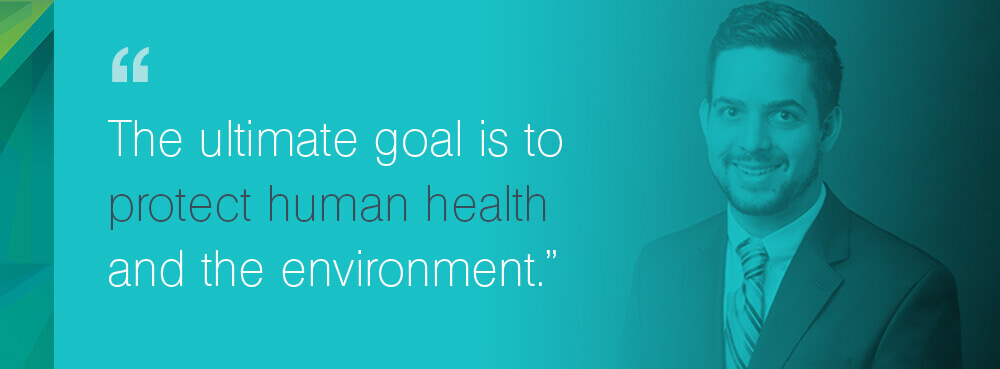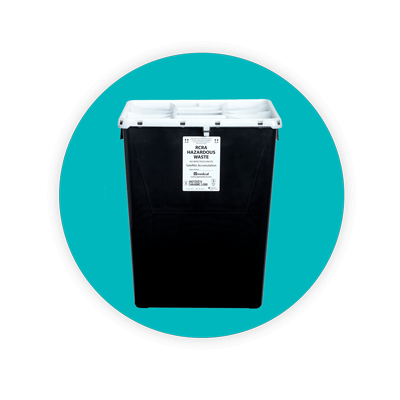Interview: the Importance of Hazardous Waste Management

Updated: August 28th, 2019
I sat down with Adam Thompson to discuss the importance of proper hazardous waste management in healthcare. His expertise in this area has earned him the unofficial title of “Haz Master.”
Adam has been with Daniels for two years and is originally from South Carolina (go Clemson tigers!). His dedication to protecting the environment and safety of those in healthcare makes him an invaluable asset to the team.
Describe your role at Daniels Health:
“I try to be involved in all things hazardous waste. There are two sides to what I do: customer management and operations.
- From a customer management standpoint, I provide advice and auditing services. I make sure that all our customers are following all regulations.
- From an operations perspective, I do my best to drive the hazardous waste program forward by creating new content for our employees, by working with other hazardous team members to create Standard Operating Procedures and keep our staff and our customers compliant. I also consult with our sales department in gaining new healthcare partners and providing smooth setup of new sites.
And sometimes I even get my hands dirty by doing waste segregation—well not really dirty because I wear gloves and personal protective equipment.”
Adam, you’re a great enforcer of correct terminology when it comes to healthcare waste. What terms should we clear up before we begin?
- RCRA | Legislation that dictates how hazardous waste should be managed, transported, and disposed.
- EPA | The governing body that enforces the RCRA legislation.
- Formulary | A comprehensive list of all medications used at a facility, including NDC codes if able
- NDC Code | National Drug Code – This is drug, strength, and size specific (ex. NDC 0000-0000-00)
What is the first thing a facility should consider when managing this waste stream?
“The first thing they should consider is determining how much hazardous waste they’re actually generating. This directly affects what their generator status is considered.”
…and what is generator status?
“Basically, this dictates the stringency of a site’s legal obligations. Here is a great resource for everyone when it comes to generator status.”
What do you think is the most common mistake people make when managing with their hazardous waste?
“Honestly, improper segregation. Sometimes hazardous wastes are classified as non-hazardous and vice versa. This lack of correct segregation can lead to non-compliance, damage to the environment, and result in facility’s overpaying for disposal.”
How can improper segregation be avoided?
“Daniels actually offers in-service training as well as content that sites can display to help easily encourage compliant segregation. We also provide formulary characterization to help determine what your different waste classes are. You can read more about our formulary analysis process here.”

Some people find this waste stream intimidating. What piece of advice would you give to a facility who is working to become fully compliant in their disposal of this stream?
“Take comfort in knowing around 90% of pharmaceuticals are not considered hazardous. In a realistic setting, each department is only going to be handling a handful of pharmaceuticals that are considered hazardous. I’d start by learning which medications are hazardous and go from there!”
What repercussions can someone experience who is in non-compliance for their pharmaceutical waste?
“The worst-case scenario is that incompatible materials could react and create a dangerous situation; think, mushroom cloud. Well, not that severe but still bad—more like chemical fires or reactions. From a legal perspective, sites can be fined for improper management. It’s extremely important to properly segregate hazardous waste so that patients, workers, and everyone in that environment remain safe. This is not a waste stream to cut corners with on management; do it right.”
The EPA recently adopted a new pharmaceutical standard, Subpart P. Can you tell us more about that?
“Essentially this new standard creates a sewer ban on RCRA Hazardous Pharmaceuticals. This will help keep ourselves and the environment safe. You can read more about Subpart P here.”
Why is it important to you that people are compliant in their hazardous waste management?
“The ultimate goal is to protect human health and the environment. Increasing studies have shown that pharmaceuticals getting into our water supply are negatively impacting human health. Proper management reduces the number of chemicals that are entering our water table and being ingested by wildlife.”
Do you have any parting advice for pharmaceutical waste management?
“If at all possible, try not to create waste that’s both infectious and hazardous. For example, if a patient is being given medication via syringe. Me mindful to remove the correct amount of medication needed for treatment, that way when the injection is done there is not leftover medication in the now contaminated sharp. Blood + leftover medication = unnecessary infectious, hazardous waste.“
We are thankful for Adam’s time and insight into what many people feel is a complicated waste stream to manage. However, with Adam’s help and Daniels’ solutions, management of hazardous waste doesn’t have to be such a daunting task. We work together to ensure that facilities have easy setup of service and are confident in their education to remain compliant. Click to learn more about our solutions pharmaceutical or hazardous healthcare waste.
Let's Talk!
Your time is valuable, and we don’t want to play hard to get. You can either phone us directly on the details listed on our contact page, or feel free to fill out this short form and one of our team members will get back to you as quickly as possible.
